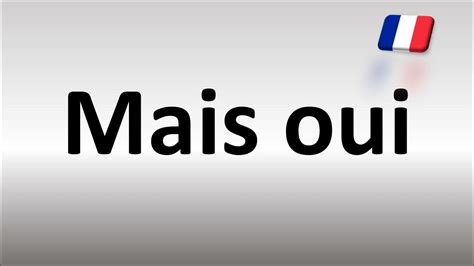Understanding the Phrase “Mais Oui”

The phrase “Mais Oui” is a French expression that translates to “But yes” in English. It is often used to convey a sense of agreement, confirmation, or emphasis, similar to how one might use the phrase “of course” or “certainly” in everyday conversation. To fully grasp the nuances of “Mais Oui,” it’s essential to explore its usage within various contexts and the cultural significance it holds in French-speaking communities.
Cultural Significance and Usage
In French culture, “Mais Oui” is more than just a casual affirmation; it’s a way to acknowledge a statement while also indicating a level of surprise or unexpectedness that the speaker would even need to confirm such an obvious fact. For instance, if someone asks, “Vous allez venir au cinema ce soir?” (“Are you going to the cinema tonight?”), a response of “Mais oui, j’ai déjà acheté les tickets” (“But yes, I’ve already bought the tickets”) not only confirms the plans but also emphasizes the speaker’s commitment and preparation.
Moreover, the tone in which "Mais Oui" is spoken can significantly alter its interpretation. Spoken with a rising intonation, it can invite further discussion or express mild surprise. Conversely, a falling intonation can convey a sense of finality or confirmation without inviting debate. This versatility makes "Mais Oui" a versatile tool in French communication, allowing speakers to navigate complex social interactions with precision and nuance.
Comparison with Other Expressions
| Expression | Meaning | Usage Context |
|---|---|---|
| Mais Oui | But yes | Emphasis on the obviousness or confirmation of a fact. |
| Oui | Yes | Simple affirmation without additional emphasis. |
| Si | Yes | Used in response to a negative question, similar to “yes” in English. |
| Certainement | Certainly | Strong affirmation, indicating no doubt. |

Understanding the differences between these expressions can help non-native speakers navigate the intricacies of French conversation. For example, saying "Oui" might simply acknowledge a question, whereas "Mais Oui" suggests that the affirmation should be obvious or already understood. This distinction is crucial in avoiding misunderstandings and ensuring clear communication.
Practical Applications and Examples

In practical terms, mastering the use of “Mais Oui” can greatly enhance one’s ability to communicate effectively in French. It’s not just about translating words but about conveying the right attitude and emphasis. For instance, in a professional setting, using “Mais Oui” to confirm a meeting or appointment can project confidence and reliability. In social situations, it can be a polite way to express surprise or interest, helping to build rapport with others.
Historical and Evolutionary Context
The evolution of the French language has been influenced by various factors, including historical events, cultural exchanges, and geographical expansions. The phrase “Mais Oui” itself is a product of this evolution, reflecting the complex interplay between affirmation and emphasis in French communication. Understanding its historical context can provide deeper insights into its usage and significance, demonstrating how language adapts to the needs of its speakers over time.
Key Points
- The phrase "Mais Oui" translates to "But yes" and is used for emphasis or confirmation in French.
- It conveys a sense of agreement or obviousness, often with a tone of mild surprise.
- The expression is culturally significant and its usage can vary across different French-speaking regions.
- Mastering "Mais Oui" can enhance communication skills in French, both in professional and social contexts.
- Understanding its historical and evolutionary context provides deeper insights into its significance and usage.
FAQs
What is the main difference between “Oui” and “Mais Oui”?
+The main difference lies in the emphasis and context. “Oui” is a simple affirmation, while “Mais Oui” emphasizes the obviousness or confirmation of a fact, often with a hint of surprise.
How does the tone affect the meaning of “Mais Oui”?
+The tone can significantly alter the interpretation. A rising intonation can invite further discussion, while a falling intonation can convey finality or confirmation without debate.
Can “Mais Oui” be used in formal and informal settings?
+In conclusion, “Mais Oui” is a versatile and nuanced expression in the French language, offering a way to convey agreement, confirmation, and emphasis with precision. Its cultural significance, varied usage, and historical context make it a fascinating topic for exploration, demonstrating the richness and complexity of human communication.



